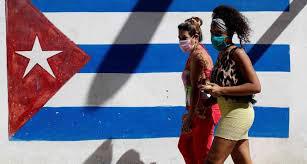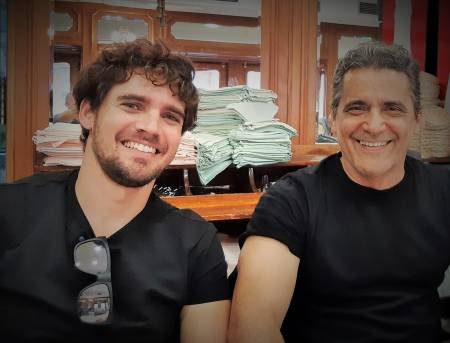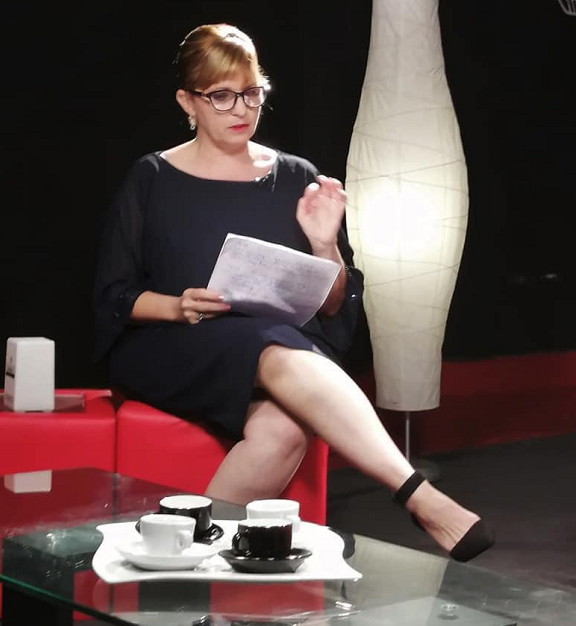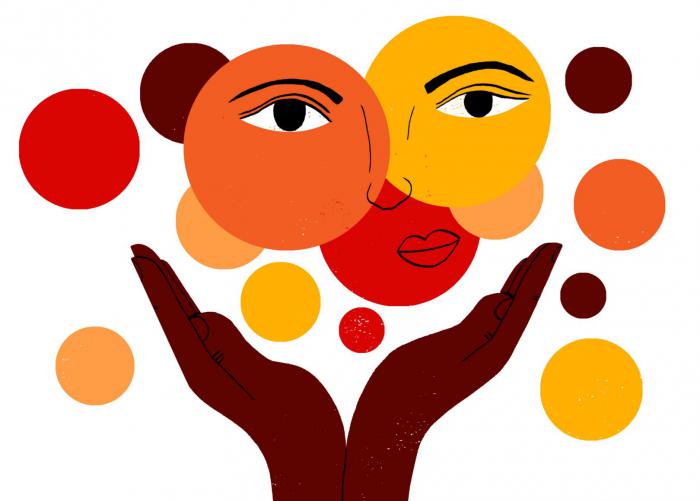Violence Against Women 4
The Strength of Women with the Revolution

The Strength of Women with the Revolution (+Video)
Teresa Amarelle Boué, a member of the Political Bureau and general secretary of the FMC, told Granma that in the midst of the media misrepresentation campaign against Cuba, fighting her is among the priorities of the Federation, which will reach its 61st anniversary.
Translated and edited by Walter Lippmann for CubaNews.

Photo: Taken from the Internet
Cuban women will always be at the side of the Revolution, in defense of the principles and rights conquered for more than six decades. This was emphasized by Teresa Amarelle Boué, member of the Political Bureau and secretary-general of the Federation of Cuban Women (FMC), an organization that, with that conviction, as part of its essence, will reach its 61st anniversary.
In the midst of the media misrepresentation campaign against Cuba, she referred to Granma that fighting it is among the Federation’s priorities: “We are an organization that has legal authority, a non-governmental organization, but that does not mean that we are against the Government or the leadership of the Revolution, because it was the Revolution that dignified Cuban women and that is what we defend.
“We defend the Revolution because we want that in Cuba women have the right to employment, that there are schools, free education and that our women can be more than 62% of university graduates,” she said.
In another moment of her statements, during a meeting held with the press, she highlighted the importance of the National Program for the Advancement of Women. “Women have to know what the Program proposes; this work we are doing in the communities, the laundromats we are increasing, the strategy itself on violence, which should come out in the next few days with a legal norm; the work we are doing in the Women and Family Guidance Houses.
“We must start in the communities a workshop on gender violence, and we are also working on training the Police and legal personnel on everything that has to do with women’s rights so that they are in a position to exercise a better role in this regard.”
She said that next August 23 the FMC will reach its 61st anniversary with the motivations left by the 8th Party Congress. She pointed out that they will organize dialogues among women in each of the municipalities, and the Fidel and the Revolution of Women workshops, on the occasion of the 95th birthday of the Commander in Chief, always respecting the epidemiological norms.
Among the actions to be carried out in the coming days are a process of deep community intervention to stimulate citizen participation in the communities, as well as volunteer work, special matinees and recognitions to artists, founders and outstanding women in the fight against the pandemic.
The tribute to Vilma Espín Guillois will take place on August 23 at the Second Front, in the mausoleum where her remains rest. The commemorative day will also include the presentation of the Mariana Grajales and Ana Betancourt orders, the August 23 distinction and the 60th Anniversary stamp.
Men’s things… and women’s…

Men’s things… and women’s…
Masterfully conducted by Doctor in Historical Sciences Julio César González Pagés and directed by Yolanda Cabrales, a new proposal of Cubavisión channel has already put on the table two topics that generate a range of opinions: machismo and feminism.
Author: Aracelys Bedevia

Digital |digital@juventudrebelde.cu…
March 9, 2021
Translated and edited by Walter Lippmann for CubaNews.

Julio César González Pagés (right) with Yonnier Angulo, who is in charge of the Men in Tangles section. Autor: Juventud Rebelde Publicado: 09/03/2021 | 09:16 pm
The enigma of femininity has made men of all times cavillers. [quibblers] —Sigmund Freud
One more step forward in the effort to build a more humane society, a victory for those of us who work and dream for a better world, represents the program Cosas de hombres [Men’s Things] which has been broadcast every Monday for the past two weeks at 10:15 p.m. on Cubavisión channel.
Masterfully conducted by Doctor in Historical Sciences Julio César González Pagés and directed by Yolanda Cabrales, the new proposal has already put on the table two topics that generate plurality of criteria: machismo and feminism. What is it? Are we or are we not?
The guests represent a wide range of professions and activities that relate male behaviors in different social spheres. Víctor Fowler (writer), Rochy Ameneiro (singer), Omar Franco (actor), David Blanco (singer), Norma Vasallo (university professor), Andrea Doimeadiós (actress) and Marilyn Solaya (filmmaker) have spoken with Pagés so far; all of them very committed to the struggle for egalitarian spaces where men and women have the same opportunities and are valued as human beings, regardless of sex.
In Men’s Things there will be, from the scientific area, research, communication and teaching, Félix Julio Alfonso, Patricia Arés, Clotilde Proveyer, Yulexis Almeida, Tania de Armas, Yonnier Angulo, Jesús Muñoz Machín, Andrei Hernández and Francisco Cruz. Alberto Roque, Lisandra Chaveco, Yohanka Rodney, Yosvel Hernández, Oni Acosta, Enmanuel George, Arlin Rodríguez and Neida Peñalver will also be present, said Julio César González Pagés to Sexo Sentido.
Edesio Alejandro, Cristian Alejandro, Maykel Blanco, Israel Rojas, Jan Cruz, Luis Franco, Jorge Luis Robaina (Karamba), Juan Carlos Rivero (Moncada), Ernesto Blanco, Adrián Berazaín and Raúl Torres will accompany the debate with music, acting and direction. The list includes Rodrigo García, Tony Ávila, Alberto Corona, Denis Ramos, Jorge Martínez, Maysel Bello, Lizette Vila, Marcos Herrera and Sebastián Milo. Representing the athletes will be multi medalist Victor Moya, in the high jump.
Dr. Pagés, leader of the Ibero-American and African Network of Masculinities (RIAM) and author of more than a dozen titles (Macho, varón, masculino and Por andar vestida de hombre, among others), says that “the idea came up in 2013 during a visit of director Yolanda Cabrales to my house.
“She had directed Ecos de mujer and wanted to create a space where men were the protagonists. In 2020 Rafael Pérez Insua, director of Cubavisión, called on us to rethink the project. With COVID-19 we had to look for alternatives. The original idea underwent changes, but gained nuances for discussion.”
-How much time will you be on screen and what other topics will you be discussing?
-We will discuss health, paternity, sexuality, violence… There will be 13 segments with a duration of 27 minutes, divided into four parts , with three guests and a section called Tangled Men, which is coordinated by Yonnier Angulo and addresses the impact of social networks on contemporary life and masculinities.
-We talk a lot about violence against women and very little about violence against men. Don’t you think that machismo is one of the reasons why this violence is invisible?
-One of the big obstacles is that women’s demands have been resisted by men who do not see them as a priority. A change of vision from hegemonic masculinities is to give them the prominent place in the effort to end inequalities in order to achieve a more equitable society.
“Revolutionary experiences have taught us that the inequalities suffered by women do not end with the end of capitalism, because there are men who are still interested in maintaining the subordination of women.
“Understanding the issue is complicated when a sector suggests that these demands can divert us from more urgent or important objectives at the national level or consider them sectoral demands, and believe that we can create the bonds of solidarity necessary to transform society without questioning male supremacy.
“More than defending men, it is about knowing [mens’] vulnerabilities and prioritizing an agenda that deconstructs the myths of [male] supremacy. We must first and foremost learn to be full humans in order to live in harmony and not be the source of so much violence and destruction.”
-Is it a good time for a program of this kind?
-Yes, it comes at an excellent time of changes in Cuban society. Laws related to our masculinities are being passed and it is important to be prepared for this. There is a great need to educate the population on the various questions related to masculinities and to offer ways to unlearn toxic macho values.
Preventing Gender Violence

Preventing Gender Violence: An End to Breaking the Silence with Unexcused Looks
 By Paquita Armas Fonseca, a Cuban journalist specialized in cultural issues. She is a regular contributor to Cubadebate and other digital media such as La Jiribilla, CubaSi and the Cuban Television Portal. She was director of El Caimán Barbudo.
By Paquita Armas Fonseca, a Cuban journalist specialized in cultural issues. She is a regular contributor to Cubadebate and other digital media such as La Jiribilla, CubaSi and the Cuban Television Portal. She was director of El Caimán Barbudo.
February 4, 2021
Translated and edited by Walter Lippmann for CubaNews.

Beatriz Torres Rodríguez is the Bety who once a week has been talking about Sexuality and daily life for 20 years. Photo: TVC Portal.
Degree in Psychology, PhD in Psychological Sciences, Master in Sexuality and Sexuality Pedagogy, Professor and Senior Researcher, President of the Cuban Multidisciplinary Society for the Study of Sexuality (SOCUMES). Beatriz Torres Rodriguez is the Bety who once a week has been talking about Sexuality and daily life for 20 years, first on CHTV and then on Canal Habana.
That has been one of her jobs as a communicator, she has had others (you will find them in this text) and soon she will be the host of Miradas sin excusas, a magazine that will precede the awaited series Rompiendo el silencio (Breaking the Silence). “The panels do not comment on the chapters of the serial, but make reflections and look for alternatives and turning points to prevent gender violence to give alternatives for coping with it” stresses this charismatic psychologist:
-Why Psychology? Is there a gene in the family?
When choosing a career as a teenager, generally as in my case, there is no effective professional orientation, but I have always been a passionate reader and lover of cinema and I was attracted by the characteristics of the characters, how they faced conflicts, how there could be different alternative solutions, which not only depended on the environment in which people developed, among other elements and that approached the studies, which I later learned, were the components of the psychological framework. Also, because from what I knew was a helping profession, at that time with the vision of patients with psychiatric disorders, which constituted and constitute for me a great mystery, despite the years of professional practice.
There is no specialist in my family related to this science.
-Why sexology?
Since I was a student at the Psychology Department of the University of Havana, I became interested in this subject and received extracurricular courses given by what was at that time the National Group for Sex Education. At the same time, I began my professional practice in a Mental Health Center, and I saw how mental health disorders, whether the most complex and chronic or the most acute, mostly have an impact on sexuality and life as a couple, at different ages of life, which leads to present, from discomfort related to this area, to disorders, with a great burden of suffering in most cases.
This was later enriched by working at the Center for Medical and Surgical Research, where I expanded my diapason to the accompaniment and treatment of patients with chronic diseases, especially non-communicable diseases such as diabetes, hypertension and chronic kidney disease among others and the impact they have on sexuality, not only because of the disease itself, but also because of all the stigmas and prejudices of the patient himself, the couple, the team of professionals and society, mostly due to the lack of knowledge or undervaluation of these issues and the impact they have on the welfare of people regardless of the disease they have.
For ten years I have been the president of the Cuban Multidisciplinary Society for the Study of Sexuality (SOCUMES), one of its multiple lines of research is precisely gender violence.
In recent years I have also participated in counseling for women in situations of gender violence, where the implications are very marked in their sexuality, self-esteem and well-being, among others. In other words, for me it is an area of knowledge of great need and sensitivity and that, in our culture, since it is considered by the majority of the population as a private matter, people delay a lot in asking for help and in some cases do not do it at all.
-Where and when did you start as a communicator?
I started in 2000 on TV in CHTV, in its magazine, with the session Sexuality and daily life, with journalist Dianik Flores, a session that I later continued in Canal Habana, since its foundation 15 years ago, together with a group of prestigious directors and hosts such as Sandra, Magdiel and the entire production team, which has allowed me to grow as a person and as a professional and a systematic dialogue with viewers, because I keep a space within the session to answer them, based on the questions of the topics presented in the space. This exchange has been very enriching and I have been given alternatives of help or orientation to different services in the cases I require. Hearing, analyzing and learning from other colleagues whom I admire and who also have their section in the Magazine, has been very useful for me.
I have participated in other TV programs, such as El triángulo de la confianza, De tarde en casa, Entre tú y yo and Pasaje a lo desconocido, among others.
In addition, since 2005 and for several years, I developed in the newspaper Trabajadores a digital consultation on sexuality in their health page. The session was called “Let’s talk about sexuality”, which for years was a very interesting experience, receiving various questions from people of different ages, marital status, schooling, even from other countries, which allowed me to get feedback on the issues that most often concerned the population about sexuality and life as a couple and that many did not dare to raise, neither to their own partners, nor in the space of consultation, so we could see the usefulness of this space. I would like to acknowledge the collaboration of the journalist Carmen Alfonso, in charge of this health page.
I have seen the importance of communication on these issues in the media, since it allows a large group in the population to become aware, reflect and learn. At the same time, as a specialist, it has helped me to be aware of what concerns the population the most, in order to be able to offer help alternatives.
-Have you taken a speech course?
In 2008-2009, together with other specialists in charge of sessions at Canal Habana and a group of journalists, I took a speech course, which was very useful and a necessary learning experience.
-How long did you prepare for this job?
I was invited to be the host or moderator of the panels of specialists of the magazine Miradas sin excusas, before the presentation of the chapters of the serial Rompiendo el silencio. Although the preparation time was short, we had the necessary and deep table work, both with its director and screenwriter Elena Palacios, Altair Reyes, the head of production and advisor Karina Paz, magnificent professionals, with whom we developed an excellent teamwork.
In addition, for some years, I have had an approach from the research with the problems related to gender violence, I was one of the coordinators of the Consensus of Gender Violence, organized in 2018 by SOCUMES and in the meetings of researchers in gender violence, organized by the Oscar Arnulfo Romero Center. For the last 5 years, we have jointly organized a colloquium on this topic. For three years I have been part of the counseling team for women in situations of gender violence in this institution. All this has made it easier for me to raise awareness and deepen my knowledge of these issues.
-What topics will be discussed?

Photo: TVC Portal.
It is a specialized magazine of analysis of the different expressions of gender violence, which will serve as a framework for the two seasons of the series Breaking the Silence. It tells the stories of women and girls in situations of violence, in its different forms of presentation, from the most recognized and obvious, such as physical violence and sexual abuse, to the more subtle, but no less serious, such as psychological and other types of violence. In its second season, it expands and diversifies to other forms of violence, such as violence against men. There is a representation of the different contexts where it can occur, such as the family, the couple, school, work, among others.
Its first season was intentionally broadcast in early December 2016, in the framework of the Day for Non-Violence against Women and Girls. For the first time, a national teleseries addressed this issue of gender violence as a central axis, which continues in its second season as a common thread.
The themes of this second season are related to:
Sexual violence against girls, adolescents and adult women in its different forms of expression.
The consequences of gender violence affect the main victims (women), but also the rest of the family members and the perpetrators themselves.
One of the consequences of GBV is the reproduction of violence, particularly for women in the double condition of victim-victimizer.
Symbolic violence that uses women’s bodies to exercise control.
Gender violence towards homosexual men, homophobia, transphobia, paternity and homosexuality.
Child abuse.
Rape within the family.
Violence between men.
Stories of characters with their conflicts, limited situations and responses to them are presented, with the aim of provoking recognition, analysis and awareness of this phenomenon of gender violence.
-Could you comment on the specialists?
The panels were composed of specialists from different fields of knowledge, who had two characteristics in common:
They were experts in their fields of knowledge and in issues related to GBV.
They are very sensitive to these issues.
We had 58 appearances, according to the characteristics of the topics, there were experts who participated in more than one panel on several occasions. Psychologists, Sociologists, Jurists, Journalists, Anthropologists, Pedagogues, Doctors, Historians, Filmmakers, Communicators and Photography Professionals, among others, were represented. Teamwork was achieved and the most important thing, in my opinion, is that we sought to enlighten the population on these issues, to see the signs of GBV, its causes, repercussions in the family, society, the different alternatives to face it and where to find turning points in the different situations that arise, in order not to reproduce violence and, most importantly, to prevent it.
-Any recommendations for viewers?
Not to be alarmed by these issues, since the important thing is to recognize the different forms of GBV, and that this is a social problem of such importance, that to stop at the number, or if it is more or less frequent, is not the essential thing, but if a single woman, girl or any person is in these situations, it deserves all our effort and attention. The most important thing is to PREVENT, so that GBV and any form of violence does not become naturalized. Hence the political will of our country and its institutions to achieve an effective, comprehensive and integrated response. This magazine is part of this effort, of the many that are needed.
The FMC, together with other institutions, is leading this strategy, which is already showing signs such as the helpline and the Women’s Advancement Program, among others.
-Is there anything I haven’t asked you or anything you’d also like to say?
Finally, I would like to thank once again the entire team of the magazine and Ms. Mareleen Díaz Tenorio, with whom we had a systematic exchange during the entire filming process, since she was the capable advisor of the series Breaking the Silence.
(Taken from TVC’s website)
Family violence: new views

A MATTER OF LAW
Family violence: new views from the legal system
The new Family Code is one of the norms that should be born in line with the constitutional precepts regarding the approach to violence in this area
Translated and edited by Walter Lippmann for CubaNews.

Photo: Internet
Myths about family violence are as old as each of its manifestations. And they are absolutely false.
That only physical assaults are expressions of violence, and that nothing else occurs in low-income households in marginal places, are some of the most common beliefs.
The reality, however, confirms daily, with sufficient eloquence, that violence can also be psychological, economic, patrimonial and can occur in all types of families, regardless of their economic or cultural level.
“She (or he) asked for it”, “jealousy is a manifestation of love”, “what happens in the family, good or bad, stays in the family”, “the letter with blood enters”, are also phrases that swell the bulky list of myths that, in the opinion of specialists, make the victim responsible, harm her perception of the abuse and neutralize her reaction and denunciation.
For Dr. Yamila González Ferrer, Vice President of the National Union of Jurists of Cuba (UNJC) and of the Cuban Society of Civil and Family Law, “the Cuban Constitution gives the highest rank to the prevention and attention to violence in the family space”.
Both in this area (Art. 85), adds the also titular professor of the Faculty of Law of the University of Havana, and in what refers to gender violence (Art. 43) and against children and adolescents (Art. 84 and 86), the 2019 Magna Carta is located in a remarkable place on a planetary scale in the constitutional approach to this issue.
The Law on Laws, specifically in Article 85, states that: “family violence, in any of its manifestations, is considered destructive of the persons involved, of families and of society, and is sanctioned by law”.
Such projection, González Ferrer considers, is comprehensive of the three scopes in which the violence in the familiar space affects negatively, and that cannot be lost sight of: the individual, the familiar one and the social one. In that same sense, the precept opens its protective fan to all the manifestations in which it can appear.
Nevertheless, the expert clarifies, “except in cases where its scope requires treatment in criminal proceedings, family violence does not usually generate any palpable legal consequence in Cuba today.
“Hence the need to promote the improvement of legal mechanisms and public policies, so that there is no impunity and the highest protection is provided to the victims”.
According to González Ferrer, it is necessary to elaborate new legal provisions and to modify or perfect other existing ones, not only in substantive family matters, but also in contractual, succession, procedural and criminal matters, so that it is possible to develop the constitutional postulates.
The new Family Code, therefore, is one of the norms that should be born tempered to the precepts of the Magna Carta as to the treatment of family violence, as well as to the protection against any of its manifestations.
THE ROOTS OF PAIN
Yamila González, who also coordinates the UNJC’s Gender Justice Project, insists on defining what family violence is, and what its causes and types are, because one must always know the phenomenon in order to face it and avoid it.
According to the professor, violence in family contexts is part of the network of violence that exists in society. It is, in turn, a universal phenomenon, with its concrete historical characteristics and the peculiarities of each family group; it is a social problem that has different causes and dimensions and encompasses all types of existing families.
The very patriarchal structure of the family, recognizes González Ferrer, “makes it one of the most violent social institutions, since it develops asymmetrical power relations through gender and generation, which are the guarantors of the legitimization and reproduction of the patriarchy as a system of domination”.
Based on its interdependence with the environment, “family violence must be understood as a process. It is not casual or established overnight, but has a painful path of formation, which is established in the family climate through an endless cycle of very harmful behaviors for human beings.”
In the opinion of the Vice President of the UNJC, violence is a cultural problem, not entirely legal, so it must act on the social, educational, cultural resources that make it possible, without disregarding the use of law as and when appropriate.
In conceptual terms, she emphasizes, “family or intra-family violence is that which occurs within the family. It refers to any form of abuse that occurs among its members, and implies an imbalance of power that is exercised from the strongest to the weakest”.
The expressions of family violence are the physical, psychic, moral, sexual, economic or patrimonial abuse, either by action or omission, direct or indirect, in which aggressors and victims maintain or have maintained couple relationships, as well as the one that takes place between relatives. The same treatment must be given to acts of this nature committed between people in cohabiting relationships.
In the words of the expert, there are three significant ways in which family violence is expressed, since in the patriarchal, hierarchical family, power is exercised along two fundamental lines: gender and generation.
GENDER VIOLENCE
It is a very particular type of violence, based on a patriarchal culture, rooted in the inequality of power between men and women. It is based on sexist stereotypes, which generate prejudice and lead to expressions of discrimination based on sex, gender, sexual orientation or gender identity.
It can be physical, psychological, sexual, moral, symbolic, economic, or patrimonial, and has a negative impact on the enjoyment of rights, freedoms, and the integral well-being of people.
It occurs in family, work, school, political, cultural, and any other environment in society. Its most generalized, frequent and significant expression is that which occurs against women.
Nevertheless, gender violence against men exists, such as homophobia, for example, when they are attacked for having transgressed gender norms from the canons of hegemonic masculinity; or the mocking and questioning that those who assume co-responsibility for domestic tasks and the care of their children may receive and are then criticized by their relatives, co-workers, or friends.
VIOLENCE AGAINST THE ELDERLY AND THOSE WITH DISABILITIES
It is one that manifests itself against people because of aging, given the decrease in their physical and intellectual capacities, economic and social participation.
Its most common expressions are physical and emotional abandonment, hygienic, medical and food neglect, underestimation, financial and patrimonial manipulation, physical and verbal abuse.
VIOLENCE AGAINST CHILDREN AND ADOLESCENTS
This is what happens with respect to children and adolescents because of their condition as developing persons. Even if it is not directly about them, it is considered direct violence because it affects the adequate development of their personality and the feeling of security and trust in those around them, with transcendence to their social life.
On this sensitive subject, some think that, in situations of violence within the family, if it is not about the person of the son or daughter, there is no significant level of affectation, when the damage derived from living in violent environments is severe for the integral development of their personality and with very negative consequences towards the future.
Whatever the nature of the conflicts, Gonzalez Ferrer says, “their solution should not be managed in a violent way but through communication and negotiation. There is an urgent need for education and a culture of peace, of respect for human rights, based on the need to learn to live and relate in harmony.
Subscribe to Blog via Email
| M | T | W | T | F | S | S |
|---|---|---|---|---|---|---|
| 1 | 2 | 3 | 4 | 5 | 6 | 7 |
| 8 | 9 | 10 | 11 | 12 | 13 | 14 |
| 15 | 16 | 17 | 18 | 19 | 20 | 21 |
| 22 | 23 | 24 | 25 | 26 | 27 | 28 |
| 29 | 30 | |||||

You must be logged in to post a comment.